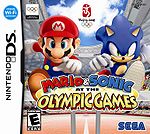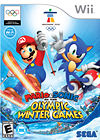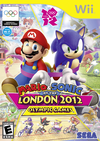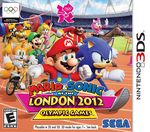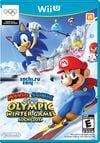Mario & Sonic (series)
Template:Series-infobox The Mario & Sonic series is a collection of crossover sports games featuring characters from Nintendo's Mario series and Sega's Sonic series. These series marked the first time Mario and Sonic ever appeared together in a videogame.
The series began when Sega acquired the license to create videogames based on the Olympic Games, intending to create a version featuring characters from its well-known Sonic franchise. Due to the atmosphere of competitive sportsmanship the Olympics had to offer, Sega received approval by Nintendo to include Mario's characters in the game with Sonic. The series has been overall well-received praised by the media, mainly for being a crossover between Mario and Sonic, with the gameplay and multiplayer having been praised as well. However, it has been criticized for the choice of setting for both series, the controls, and having the Olympics be the only theme in the series.
Games
Mario & Sonic at the Olympic Games
- Year Released – 2007 (Wii), 2008 (Nintendo DS)
Mario & Sonic at the Olympic Games is the first game in the series and the first game ever to establish a crossover appearance with Mario and Sonic, in addition to including a cast of characters hailing from the same franchises respectively. The game was released for both Wii and Nintendo DS, each one featuring exclusive content. The game is based on the Beijing 2008 Summer Olympics and includes 20 real-life events and the ficticious Dream Events (based on settings for both Mario series' environments and Sonic series' environments).
Mario & Sonic at the Olympic Winter Games
- Year Released – 2009
- System – Wii, Nintendo DS
Mario & Sonic at the Olympic Winter Games is the second game in the series, but this time the setting takes place at the Vancouver 2010 Winter Olympics which includes different events from the previous games. It also incorporates new characters in the series, including Donkey Kong and Metal Sonic. Much like its predecessor, it was released for both Wii and Nintendo DS. In addition, the Nintendo DS version includes an exclusive Adventure Mode revolving around a plot involving Bowser and Dr. Eggman's scheme to melt all the snow by capturing the Snow Spirits in Christmas Village, prompting Mario and Sonic to stop them.
Mario & Sonic at the London 2012 Olympic Games
- Year Released – 2011 (Wii), 2012 (Nintendo 3DS)
Mario & Sonic at the London 2012 Olympic Games is the third installment of the series featuring new sports and events. It is the first in the series to be released for the Nintendo 3DS and now takes place in London, home of the 2012 Summer Olympics. The Nintendo 3DS exclusive adventure mode begins with Bowser and Dr. Eggman releasing a colorful fog that ruins the Olympics. The heroes must find a way to put an end to this fog in a total of seven adventure stories.
Mario & Sonic at the Sochi 2014 Olympic Winter Games
- Year Released – 2013
- System – Wii U
- Mario & Sonic at the Sochi 2014 Olympic Winter Games is the fourth installment in the series. It is the first in the series to be released for the Wii U, and is the first not be released on a portable system. The game takes place at Sochi, Russia, home of the 2014 Winter Olympics.
Playable characters
Characters that are introduced in Mario & Sonic at the Olympic Games
- Mario
- Sonic
- Luigi
- Tails
- Amy
- Peach
- Blaze
- Daisy
- Wario
- Dr. Eggman
- Waluigi
- Knuckles
- Bowser
- Vector
- Yoshi
- Shadow
Characters that are introduced in Mario & Sonic at the Olympic Winter Games
Trivia
- The first game was believed to be an April Fools Joke as the game was revealed on March 28. However, soon after, Sega stated on their official website that the game was official, and that both Sega and Nintendo were working on the game project.
- Additionally, as the announcement of the Mario & Sonic Olympics video game series was revealed (starting with Mario & Sonic at the Olympic Games), the agreement was also reached that in the case of publishing and marketing duties for each Mario & Sonic Olympics installment, Sega would handle the process for all territories outside of Japan while Nintendo would handle the process inside of Japan itself. The fourth game, however, was published by Nintendo outside of Japan rather than SEGA.
